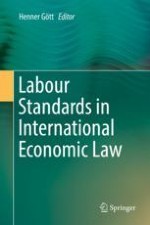2018 | OriginalPaper | Buchkapitel
An Individual Labour Complaint Procedure for Workers, Trade Unions, Employers and NGOs in Future Free Trade Agreements
verfasst von : Henner Gött
Erschienen in: Labour Standards in International Economic Law
Aktivieren Sie unsere intelligente Suche, um passende Fachinhalte oder Patente zu finden.
Wählen Sie Textabschnitte aus um mit Künstlicher Intelligenz passenden Patente zu finden. powered by
Markieren Sie Textabschnitte, um KI-gestützt weitere passende Inhalte zu finden. powered by
